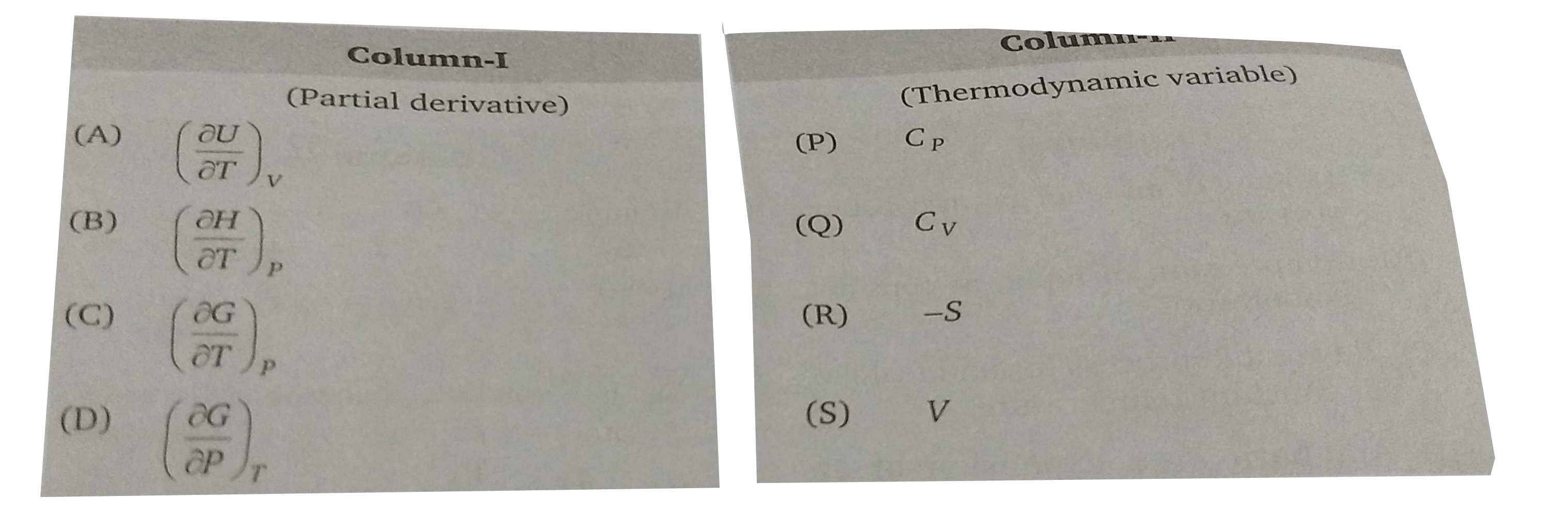Calculate average molar heat capacity at constant volume of gaseous mixture contained 2 mole of each of two ideal gases A(Cv,m=32R) and B(Cv,m=52R):Solution in Punjabi
R
2R
3R
8R
The correct Answer is:B
Average Cv,m=n1Cv,m1+n2Cv,m2n1+n2
=2×32R+2×52R2+2=2R
Topper's Solved these Questions
- THERMODYNAMICSBOOK - NARENDRA AWASTHICHAPTER - THERMODYNAMICSEXERCISE - Level 3 - One Or More Answers Are Correct
1 Videos
- THERMODYNAMICSBOOK - NARENDRA AWASTHICHAPTER - THERMODYNAMICSEXERCISE - Level 3 - Match The Column
2 Videos
- THERMODYNAMICSBOOK - NARENDRA AWASTHICHAPTER - THERMODYNAMICSEXERCISE - Level 2 (Q.1 To Q.30)
1 Videos
- STOICHIOMETRYBOOK - NARENDRA AWASTHICHAPTER - STOICHIOMETRYEXERCISE - Level 3 - Subjective Problems
20 Videos
Similar Questions
Assume ideal gas behaviour for all the gases considered and neglect vibrational degrees of freedom. Separate equimolar sample. Separate equimolar samples of Ne, O2 , CO2 and SO2 were subjected to a two process as mentioned. Initially all are at same state of temperature and pressue.
Step I → All undergo reversible adiabatic expansion to attain same final volume, which is double the original volume thereby causing the decreases in their temperature.
Step → After step I all are given appropriate amount of heat isochorically to restore the original temperature.
Mark the correct option(s) :
View SolutionMatch the following columns

View SolutionWrite structure of 2,2-dimethylheptane.
View SolutionWhat volume of a liquid (in L) will contain 10 mole ? If molar mass of liquid is 280 and its density is 1.4 g/mL.
View SolutionFor an ideal monoatomic gas, molar heat capacity at constant volume (C_(v)) is
View SolutionCalculate average molar that capacity at constant volume of gaseous mixture contained 2 mole of each of two ideal gases A(Cv,m=32R) and B(Cv,m=52R):
View Solution0.5 mole each of two ideal gases A (C_(v,m)=(5)/(2)R) and B (C_(v,m)=3R) are taken in a container and expanded reversibely and adibatically , during this process, temperature of gaseous mixture decreased from 350 K and 250 K. Find DeltaH (in "cal"//"mol" ) for the process :
View Solution0.5 mole each of two ideal gases A (C_(v,m)=(5)/(2)R) and B (C_(v,m)=3R) are taken in a container and expanded reversibly and adiabatically, during this process temperature of gaseous mixture decreased from 350 K to 250 K. Find DeltaH (in cal/mol) for the process :
View SolutionAssertion. For CO_(2) , the ratio of the molar heat capacities ( C_(p) //C_(v)) is 1.40. Reason . For CO_(2) , C_(v) = (5)/(2) R and C_(p) = ( 7)/( 2) R
View SolutionCalculate the average molar heat capacity at constant volume of a mixture containing 2 moles of monoatomic and 3 moles of diatomic ideal gas.
View SolutionThe gaseous mixture containing 2 moles of each of two ideal gases A(CV,m=32R)
and B(CV,m=52R). Find out the average molar heat capacity at constant volume.
View SolutionThe molar specific heats of an ideal gas at a constant pressure & volume are denoted by C_(P ) & C_(v ) if r = (C_(p))/(C_(v )) & R the universal gases constant then C_(v ) is equal
View SolutionTwo moles the an ideal gas with C_(v) = (3)/(2)R are mixed with 3 of anthoer ideal gas with C_(v) = (5)/(2) R . The value of the C_(p) for the mixture is :
View SolutionFor one mole of an ideal gas (C_(p) and C_(v) are molar heat capacities at constant presure and constant volume respectively)
View SolutionCalculate average molar heat capacity at constant volume of gaseous mixture contained 2 mole of each of two ideal gases A(Cv,m=32R) and B(Cv,m=52R):
View Solution
